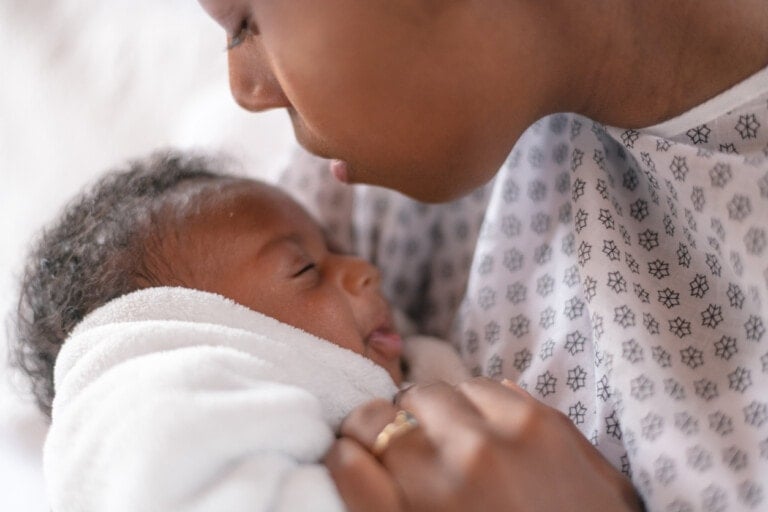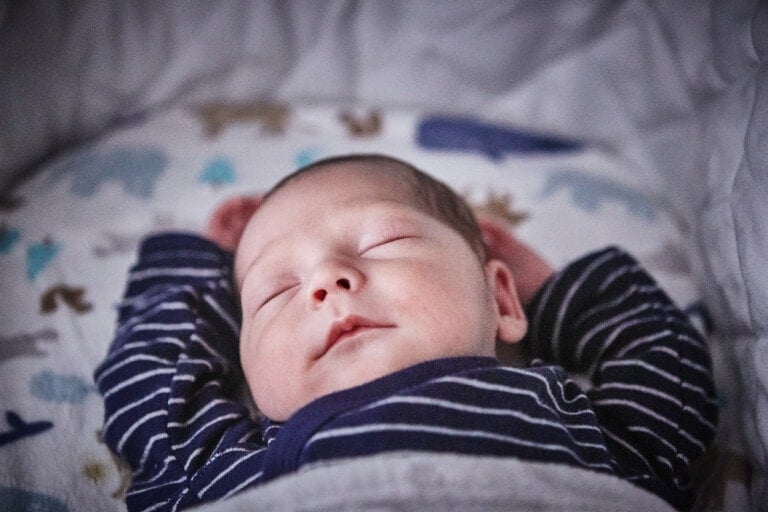Parenthood is no easy feat. For new parents just starting out, nothing is more challenging than getting their newborn to sleep throughout the night and sticking to a routine. If you can sleep consecutively for more than a few hours, you may wonder how you got so lucky. Or you may be anxiously concerned something is wrong with your infant.
As every parent knows, sleep training your little one is challenging and requires a lot of trial and error mixed with patience. Many resort to books, mommy blogs, and loved ones for guidance and support in hopes of finding an answer to the riddle.
Unfortunately, some recommendations may do more harm than good. Some have received more backlash than others. The Babywise method—a feed-wake-sleep training program for parents—in particular, has experienced much criticism from several pediatricians, hospitals, and parenting experts for its rigid guidelines, warning new moms and dads to proceed with its recommendations with caution.
What Is the Babywise Method?
On Being Babywise, better known as Babywise, is a book by husband and wife Gary and Anne Marie Ezzo. The Babywise method is a sleep training tool for parents that promises the results of a baby sleeping through the night, which we know is a dream of every new mom and dad. We’ve summarized the basic guidelines of the book below:
Stick to a Schedule All Day Long
Babywise guides parents to feed their little ones about every two-and-a-half to four hours, depending on their age. Compared to on-demand eating (feeding your baby when they show signs of hunger), babies on this stricter routine must be fed upon waking, played with after feeding, and then put back to sleep. They will repeat the process in that exact order all day long. This “eat, wake, sleep” approach is encouraged for newborns and infants up to 6 months old.
Set a Wake-up Time and Bedtime
The book advises that parents create a wake and sleep schedule to help set their baby’s internal clock. The most commonly followed regimen is a 7 a.m. wake and a 7 p.m. bedtime.
Allow for Full Feedings
The authors also add that babies should take a full feeding to fill their stomachs for a more extended period. They believe this ensures a longer and more comfortable sleep. According to the Ezzos, infants on this strict regimen should sleep throughout the night from an early age, typically around eight to 12 weeks old.
Wake up Your Little One to Eat
Babywise further recommends that babies be woken up to eat to help them stick to the specified schedule. It also suggests that parents allow enough feeding throughout the day. The attachment parenting style, which promotes constant physical closeness and responsiveness to their newborn, advises parents to feed their babies on cue instead.
Create a Comfortable Sleep Environment
The book says it’s important to make your baby feel comfortable to help them sleep through the night. You can close the blinds or curtains and dim the lights. Use a small white noise machine to block out any sounds that could wake them. Sticking to the ritual before each sleep is important, even if it’s a nap.
Use a Swaddle
Another tactic to help your newborn sleep better is using a swaddle. This prevents the Moro reflex (or startle reflex) from occurring. This reflex causes babies to feel like they’re falling while asleep, thus causing them to make jerk movements out of fear. As a result, the sudden gestures can startle them awake. However, a swaddle will confine their movements, and they can stay asleep.
Why Is Babywise Controversial?
The Babywise program has received backlash and harsh criticism from pediatricians and parents who believe the “Parent Directed Feeding” guidelines, as the book refers to it, can place infants at higher risk of malnutrition, emotional disorders, and failure to thrive.
In 1998, the American Academy of Pediatrics (AAP) warned parents against the book’s recommendations.1 They stated that it could lead to dehydration, delayed development, lack of weight gain, impaired growth, and involuntary early weaning in infants. The AAP further added that the advice could lead to a lack of milk supply in mothers.1
Another primary concern of the AAP is Ezzos’ advice to feed infants based on a parents’ self-made schedule rather than when they are showing signs of hunger. In the AAP’s 1994 parenting guide, Caring for Your Baby and Young Child: Birth to Age 5, which over 70 doctors co-authored, parents are advised to feed their baby based on the schedule the infant “designs himself.” The book states, “Your baby lets you know when he’s hungry. Whenever possible, use (your baby’s signals) rather than the clock to decide when to nurse him.”2
The AAP further added, “Scheduled feedings designed by parents may put babies at risk for poor weight gain and dehydration.”2 Instead, they suggest parents should nurse newborns at least once every two to three hours or whenever they show signs of hunger, such as mouthing, rooting, or an increase in alertness and activity.
There are many professional and personal perspectives on feeding and sleep training. Remember to follow your baby’s routine and cues. And always use books and other sleep resources as a guide rather than a requirement.
































